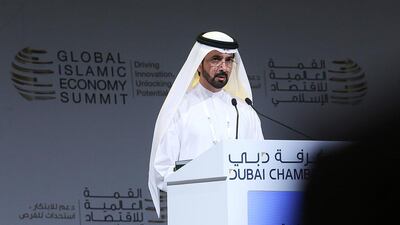The Central Bank governor expects economic growth to slow to 3 per cent this year as the weaker oil price hits investment.
Mubarak Rashed Al Mansoori said the Government is still committed to spending on infrastructure projects amid the biggest slide in oil since the financial crisis of 2008 but would try to reduce unnecessary costs as the economy slows.
“The Government is still continuing with its spending, though they will rationalise any unnecessary investments,” Mr Al Mansoori told reporters in Dubai yesterday. “And some people might argue for governments like the UAE, maybe it’s an opportune time to execute projects at a lower cost. So we will continue necessary projects.”
Mr Al Mansoori said that he expected economic growth to slow to 3 per cent this year from 4 per cent last year. The lender of last resort does not have a forecast for 2016 yet, but the governor said projections from sources outside the Central Bank, including the IMF, suggest that next year the economy may bounce back, growing 3.6 per cent.
The slump in oil, which has shed more than half of its value in the past year amid an increase in production from North America and a decrease in demand from big guzzlers such as China and other emerging markets, has been the main driver behind the slowdown of the UAE’s economic growth.
The UAE is the sixth-largest producer of oil in the world and uses revenue from crude sales to fund more than 60 per cent of the federal budget.
UAE banks are becoming increasingly risk-averse when weighing loans to businesses.
Still, loan books are growing as banks remain well capitalised and are not suffering from a shortage of funds, Mr Al Mansoori said. He said the average capital adequacy ratio for the banking sector is hovering at around 18 per cent, well above regulatory requirements.
“These strengths allowed our banking sector to expand credit despite a noticeable slowdown in deposit growth,” Mr Al Mansoori said. “This was made possible thanks to a satisfactory, albeit tightening liquidity situation for banks.” Still, the Central Bank said last month that loan growth slowed to an annual 7 per cent in September from 8.6 per cent in August, the slowest rate of growth since February last year.
As a result, many bank chiefs expect loan growth to cool next year.
Alex Thursby, the chief executive of National Bank of Abu Dhabi, the biggest lender by assets in the UAE, said last month in an interview with The National that he expected UAE loan growth to rise by about 5 per cent next year, nearly half the expansion rate over the past few years.
On the subject of expectations of rising US interest rates, Mr Al Mansoori said that interest rates on deposits would rise if the US Federal Reserve started raising interest rates after a stretch of seven years of low rates, as is widely expected to happen soon. However, he said that rates at local banks are already rising in anticipation of that move.
“I think rates are already in the system,” Mr Al Mansoori said. “They have already increased. It’s not because of liquidity. It’s because of expectations that the Fed will increase rates. It’s already in the system.”
The UAE dirham is pegged to the US dollar and broadly follows the monetary policy of the US Federal Reserve. Mr Al Mansoori reiterated his stance on the peg amid concern by some observers that the dirham may be overvalued because of the strengthening greenback, saying there was no chance that the UAE would remove the peg.
mkassem@thenational.ae
Follow The National's Business section on Twitter

